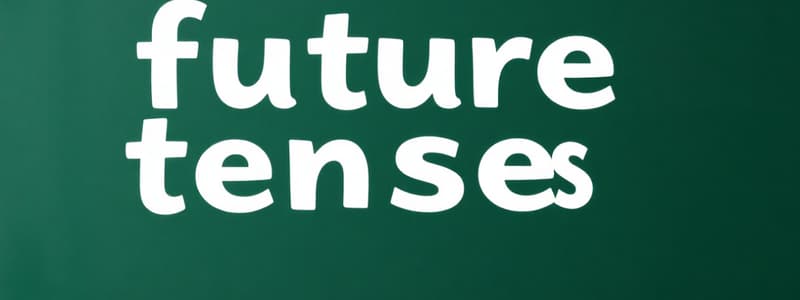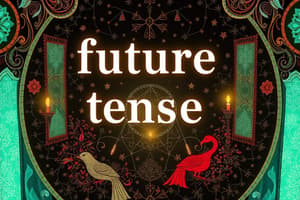Podcast
Questions and Answers
The word 'will' is used for making future actions and __________ at the moment of speaking.
The word 'will' is used for making future actions and __________ at the moment of speaking.
decisions
'Be going to' is often used to make predictions based on __________ evidence.
'Be going to' is often used to make predictions based on __________ evidence.
present
The __________ Continuous tense is used to express scheduled events.
The __________ Continuous tense is used to express scheduled events.
Present
The __________ Present tense can also describe scheduled events.
The __________ Present tense can also describe scheduled events.
The document mentions more advanced future tenses such as Future Continuous and __________ Perfect Simple.
The document mentions more advanced future tenses such as Future Continuous and __________ Perfect Simple.
Flashcards
Be going to
Be going to
Used for predictions made based on present evidence, existing plans, and intentions.
Present Continuous for Future
Present Continuous for Future
Used for expressing scheduled events, such as appointments or pre-arranged plans. This tense emphasizes the event's established status.
Will for Future
Will for Future
Used for expressing predictions or decisions made at the moment of speaking. This tense emphasizes spontaneity.
Simple Present for Future
Simple Present for Future
Signup and view all the flashcards
Future Continuous
Future Continuous
Signup and view all the flashcards
Study Notes
Future Tenses in English
- Will: Used for making predictions, future decisions, and promises
- Example: "I will walk the dog."
- Be going to: Used for expressing plans and intentions, or something is about to happen
- Example: "I'm going to meet Tom at the station."
- Present Continuous: Used for describing scheduled events or things happening around a specific time in the future
- Example: "My train leaves at 6 tomorrow morning."
- Simple Present: Used for describing scheduled events or things that are formally arranged for the future
- Example: "The children start school on Monday."
Different Future Tenses explained
- Future Simple: Predictions, promises, and decisions
- Future Continuous: Showing an action happening in the future, and ongoing.
- Future Perfect: Emphasizing the completion of an action before a certain point in the future.
- Future Perfect Continuous: Showing an action or event that has been happening continuously up to a certain point in the future
Studying That Suits You
Use AI to generate personalized quizzes and flashcards to suit your learning preferences.




